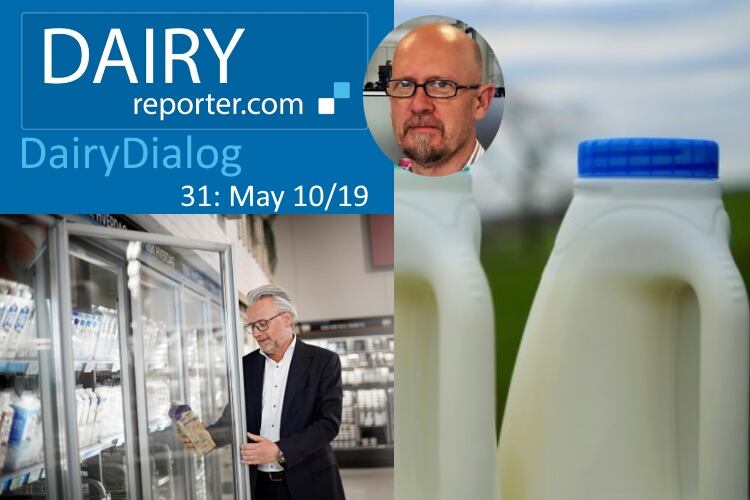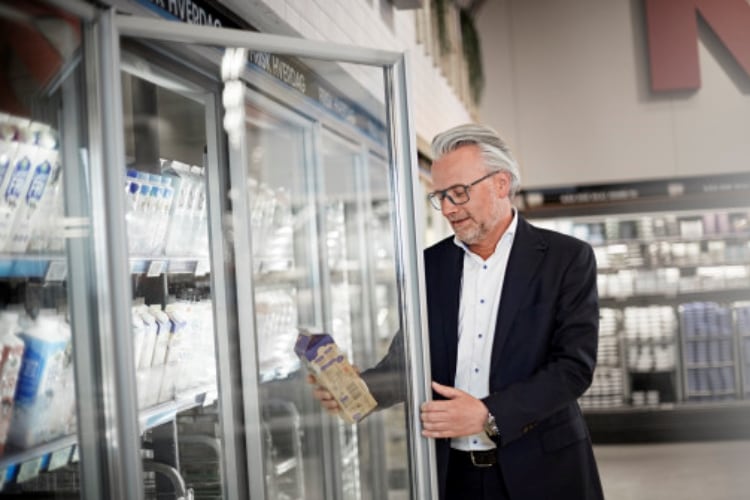Light damage of dairy produce
Ninety percent of UK dairy farmers say they are aware that light damages nutrients and taste in milk, with 62% saying the whole dairy supply chain should take responsibility for the issue, according to research published recently by packaging technology company Noluma International LLC.
Despite the knowledge among dairy farmers, only 29% of consumers are aware that light damages milk even though scientific studies have shown that both natural and indoor lighting can impact the nutritional quality, taste and smell of dairy products.
Independent testing by Cornell University in the US has shown that some nutrients, in particular protein and vitamin B2 (riboflavin), can decrease by 28% after just 20 minutes of light exposure.
Consumers also believe retailers should take action, with more than half (55%) saying supermarkets should be proactively looking to package milk produce in ‘light protected’ packaging. These findings signal the need for the whole dairy supply chain to be more transparent about the issue of light damage, Noluma said, and take measures now to prevent the negative impact on nutrients and quality.
Divya Chopra, CEO of Noluma, said, “Despite dairy farmers being aware that light causes damage to their milk, consumers just don’t have the same level of knowledge. When they do however, they want to do something about it. We want to encourage the entire dairy supply chain – from distributors to supermarkets – to take action on light protected packaging, ensuring that the milk UK dairy farmers are so proud to produce reaches consumers with the nutrients that they expect.”
The research also finds 77% of dairy farmers are concerned the quality of their produce may diminish before it reaches consumers because of current packaging standards. Most farmers surveyed (90%) say they would like to be more involved in decisions around the packaging of their produce to ensure it is as effective as possible.
Chopra added, “Despite how little dairy produce is adequately protected from light, it’s clear that there is a desire among UK dairy farmers to ensure that their milk is the best it possibly can be. That’s why we are introducing light-protection certification so that everyone – from farmer to consumer – can be confident that they’re getting the nutritious, tasty product they expect.”
About Noluma International
Noluma International is a global company with laboratories located in the US, Taiwan and in the EU. Noluma offers light protection measurement, design and certification of packaging for consumer-packaged goods. The Noluma logo certifies that packaging meets the gold standard for light protection.
Arla makes more than one billion pieces of packaging more sustainable across Europe
Dairy products in the fridges of European households are getting better for the environment. By the end of the year, across six countries, Arla is making 600 million fresh milk cartons renewable and 560 million yogurt pots recyclable, cutting 7,330 tonnes of carbon.
“We want to help people live a more sustainable life as well as feel good about what’s in their fridge. Fresh milk and yogurts are enjoyed on a daily basis in most households in our main markets and are also key to our retail customers. That’s why these items topped our list of packaging to improve from a sustainability perspective and our pan-European presence enables us to leverage our scale and impact several markets simultaneously,” says Arla’s head of Europe, Peter Giørtz-Carlsen.
It is the first big move in Arla’s new sustainable packaging strategy. It is targeting a CO2 reduction of 30% by 2030, initially committing to reduce emissions from its packaging by approximately 8,000 tonnes of CO2 every year until then. The ultimate aim is for its entire portfolio to be carbon net zero by 2050, in line with its overall climate ambition to become carbon net zero by 2050, announced last month.
The new packaging will be available for consumers in Arla’s six main European markets - Sweden, Denmark, Finland, the Netherlands, Germany and the UK.
The switch from fossil-based plastic to bio-based plastic derived from sugar cane or forest waste for the 600 million Arla milk cartons makes them 100% renewable. They also contribute 25% less carbon dioxide into the atmosphere compared to their fossil-based plastic predecessors.
For the yogurt pots, the move to recyclable plastic means that these can be given a second life if recycling systems in the markets enable this.
Back catalogue
“We have a rich back catalogue of moves that have made our packaging better for the environment over the years. But no doubt, this year’s conversion of more than one billion packaging items is one of our biggest ever. Coupled with some other smaller initiatives, it means we will hit our CO2 savings target for packaging for 2019. But we have to deliver every year, so we are already developing plans for next year’s reduction,” Giørtz-Carlsen said.
Past initiatives have included weight reductions, switching to bio-based plastics, incorporating recycled materials and replacing greenhouse gas intensive materials. Since 2005, Arla has reduced the CO2 impact of its packaging by 25%, equating to 123,000 tonnes of CO2 being diverted from the atmosphere.


